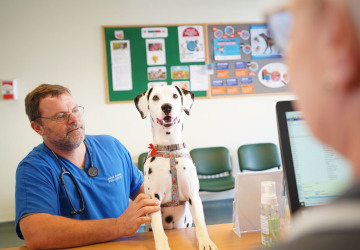
Could a change in your cat’s behaviour this winter be due to SAD?
January 21, 2024
The vets at Edgewood Veterinary Group in Essex want pet owners to understand Seasonal Affective Disorder (SAD) and how it could relate to their feline friends. If, after reading our article you think your cat could be affected by seasonal changes, book a health check with one of our cat-loving vets.
Book a New Year health check for your cat
What is Seasonal Affective Disorder?
SAD is a type of depression that typically occurs during the autumn and winter months when there is less natural sunlight. The disorder is believed to be related to changes in light exposure and can result in symptoms such as a low mood, fatigue, and changes in sleep patterns.
Whilst SAD is primarily a human condition, some cat owners have observed changes in their pets’ behaviour during the winter months, which may be related to changes in daylight and weather conditions. If you are concerned about your cat’s change in behaviour, which could also indicate other conditions, it’s wise to contact Edgewood Veterinary Group for further advice and to book a health check.
Book a New Year cat health check
Things to consider
These changes in your feline’s behaviour are not necessarily a direct manifestation of Seasonal Affective Disorder as it occurs in humans, but they could be influenced by seasonal factors. Here are some considerations for cat owners living in Essex.
1. Light exposure
Cats may spend more time indoors during the winter due to weather conditions. This will result in reduced exposure to natural daylight. This change in light exposure could potentially affect their behaviour and mood.
2. Activity levels
Similar to the point above, cold weather can limit outdoor activities for cats. Reduced exercise and mental stimulation during the winter can lead to changes in your cat’s behaviour, potentially including restlessness or decreased energy levels. Our vets and nurses often see cats’ weight increasing over the winter months due to lack of exercise, which can in turn affect their ability to move more.
3. Temperature and comfort
Cats may experience discomfort in colder temperatures, especially if they are not acclimated to it. This discomfort could affect their overall mood and behaviour.
4. Owner’s behaviour
Changes in an owner’s routine due to Seasonal Affective Disorder or other factors can also indirectly affect a cat’s behaviour. For example, if the owner is less active or less engaged with their cat during the winter months, their cat will respond accordingly.
5. Pre-existing conditions
Some cats may have pre-existing medical or behavioural conditions that make them more susceptible to changes in their environment. These conditions can be exacerbated by seasonal changes. Feline arthritis is a condition that is particularly problematic when it’s cold and will greatly affect a cat’s mood and willingness to engage or move around.
How you can support your cat
It is essential for cat owners to monitor their pet’s behaviour throughout the year and to make adjustments as needed to ensure their wellbeing. If their behaviour changes significantly, it’s a good idea to consult with Edgewood Vets’ team about a New Year health check. This can help determine the underlying causes of your pet’s behavioural changes and our vets can provide personalised guidance on how to address seasonal related factors.






